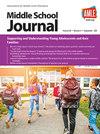Evaluating source credibility during online inquiry: Lessons from the Wonder Project
Q3 Social Sciences
引用次数: 0
Abstract
AbstractHow do students make sense of sources encountered during online inquiry, when the source types can be as varied as the topics themselves? This paper presents findings from a multiple-case study exploring how four 8th grade students evaluated source credibility while engaged in independent research during an inquiry-based information literacy curriculum. This cross-case Yinian case study explores each student’s challenges through research and instructional lenses, including sources cited, strategies implemented, and the diversity of obstacles students encountered during their independent inquiry. Findings indicated that each student’s inquiry elicited specific challenges: a student researching climate justice mistakes scientific consensus for public agreement, a student researching a current event keeps pace with rapidly evolving information, and a student determined to ban homework encounters confirmation bias. Lessons learned from these cases align with implications for pragmatic classroom instruction.Keywords: credibilitydigital readingInformation literacyonline inquiry AcknowledgmentsThe author would like to thank Dr. Jon Mundorf, Dr. Taylor Bainter, and Mr. John Bourne for their partnership during the Wonder Project, as well as all members of the Wonder Project team.Disclosure statementNo potential conflict of interest was reported by the author(s).Additional informationNotes on contributorsGillian E. MertensGillian E. Mertens is an Assistant Professor of Literacy Education at SUNY Cortland. Her research interests include critical information, media, and health literacies and their influence on applied literacy practices. E-mail: gillian.mertens@cortland.edu.评估在线查询中的来源可信度:来自Wonder项目的经验教训
当资源类型可以像主题本身一样多种多样时,学生如何理解在线查询中遇到的资源?本文介绍了一项多案例研究的结果,该研究探讨了四名八年级学生在探究性信息素养课程中从事独立研究时如何评估来源可信度。这个跨案例的易年案例研究通过研究和教学的视角探讨了每个学生的挑战,包括引用的来源,实施的策略,以及学生在独立探究过程中遇到的障碍的多样性。研究结果表明,每个学生的探究都引发了特定的挑战:研究气候正义的学生将科学共识误认为是公共协议,研究时事的学生与快速发展的信息保持同步,决心禁止家庭作业的学生遇到确认偏差。从这些案例中吸取的教训与实用课堂教学的含义相一致。关键字:可信度数字阅读信息素养在线查询鸣谢作者感谢Jon Mundorf博士、Taylor Bainter博士和John Bourne先生在Wonder Project期间的合作,以及Wonder Project团队的所有成员。披露声明作者未报告潜在的利益冲突。附加信息:作者简介:sgillian E. Mertens是纽约州立大学科特兰分校扫盲教育助理教授。她的研究兴趣包括关键信息、媒体和健康素养及其对应用素养实践的影响。电子邮件:gillian.mertens@cortland.edu。
本文章由计算机程序翻译,如有差异,请以英文原文为准。
求助全文
约1分钟内获得全文
求助全文

 求助内容:
求助内容: 应助结果提醒方式:
应助结果提醒方式:


